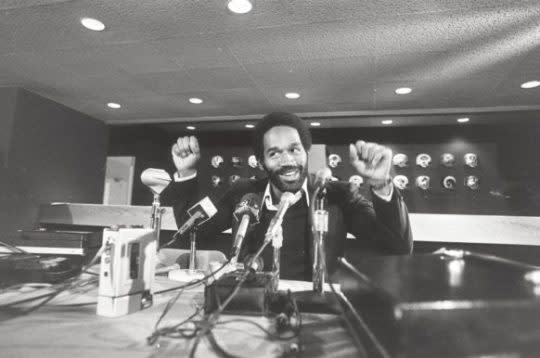‘O.J.: Made in America’: A Brilliant Look at Simpson and Race

When you get through the five-part, nearly eight hours of the new film O.J.: Made in America — and believe me, after you watch the first two hours premiering Saturday night on ABC, you’re going to want to watch the whole thing — you come away both excited and drained. It’s an amazing viewing experience. The filmmakers have taken the life story of Simpson, from his college football years to his murder trial to his current existence in prison, and turned it into a history of American culture from the late 1960s to the present. This is a startling achievement. If you watched FX’s terrific American Crime Story: The People v. O.J. Simpson and think you’re O.J.’d-out, let me tell ya: You don’t know the half of it.
Related: Summer TV Preview: The Scoop on 17 New Shows
Director Ezra Edelman, working within ESPN’s often-excellent 30 for 30 franchise, has created a unified whole — indeed, these seven-plus hours have been shown as a single movie at film festivals and in a few theaters, for the production to qualify for what would be a well-deserved Oscar award. The opening installment on Saturday gives you a context that’s been obscured since the murders of Nicole Simpson and Ron Goldman in 1994: Simpson as an all-American hero and, as one person extols him, “an incredible human being.” We must be reminded that Simpson was a groundbreaker in both his athletic achievement and in the way he used the fame that athleticism accrued.
Simpson was the first black national-advertising spokesman (for Chevrolet), and the description of the way his (literally) long-running Hertz rent-a-car ads were designed — to charm the white majority of viewers — is eye-opening. (One of the white commercial directors says without the slightest irony or blush, “He’s a good-looking man; he almost had white features.”) The subtext of Simpson right from the start of his public life was, “I’m not black — I’m O.J.” He wanted mass acceptance, and to do that, felt he ought to be judged not as a black man but, as sociologist Harry Edwards phrases it, O.J. wanted to be “judged by [his] character … O.J.’s quest was to erase race.” The documentary takes a merry turn through many of Simpson’s pop-culture appearances on talk shows, in movies such as The Naked Gun; I now want to catch up on A Killing Affair, a 1977 TV-movie Simpson made co-starring Bewitched’s Elizabeth Montgomery. Steadily, however, the mood grows darker, more bleak — with fame, money, and power, Simpson, as one of Nicole’s friends comments, “felt entitled to anything O.J. wanted.” A male friend of Simpson’s says that when it came to the attention Nicole got, “he was as jealous as he was a good football player.”
Made in America is excellent at giving us a three-dimensional portrait of Nicole Brown Simpson, who first appears at the very end of the opening installment. The film goes on to chronicle not just the abuse she suffered at the hands of O.J., but also her life as an ambitious worker, party reveler, mother, and wife. We are shown pages from Nicole’s diary in which she writes of her life with Simpson.
As for the so-called “trial of the century,” Made in America excels at framing it in the context of its era — specifically, race relations in Simpson’s base of operations, Los Angeles. Conflicts between black residents and police under the command of chief Daryl Gates; the Rodney King beating; the trial and acquittal of the accused in that beating and the riots that judgment provoked — director Edelman demonstrates how these became flashpoints that ultimately contributed substantially to Simpson’s not-guilty verdict in 1995. Marcia Clark, interviewed for the film, sums this up: “It was all so much bigger than we were.” One of the jurors interviewed here says explicitly that Simpson’s verdict was “payback for Rodney King.”
Related: Summer TV Preview: Scoop on 19 Returning Shows
Made in America doesn’t let that, or nearly any other assertion here, go unchallenged, but it brings a range of opinion and ideas rarely heard. The diversity of talking heads gathered by Edelman is mightily impressive. Harry Edwards and novelist Walter Mosley provide some of the most acute dilations upon matters of race, and the director even managed to coax two members of the jury on-camera; the latter duo will confirm your worst fears about prejudgments made before 12 people make an honest effort in a jury room.
We tend to think the Simpson story ended with his acquittal, but Made in America goes on to chart his post-trial life, one haunted by the deaths of Nicole and Ron Goldman, reminding us of the pathetic attempts Simpson made to make the kind of money he once commanded. (Not just the mini-industry of autographed merchandise, but—well, anyone remember Juiced With O.J. Simpson, his short-lived hidden-camera reality show?)
It’s all here, laid out to deplore but also to contemplate with a fresh frame of mind. Superbly edited and paced, Made in America is one of the best rise-and-fall sagas you’ll ever see on TV.
O.J.: Made in America airs Saturday at 9 p.m. on ABC; subsequent episodes air next Tuesday, Wednesday, Friday, and Saturday at 9 p.m. on ESPN.
